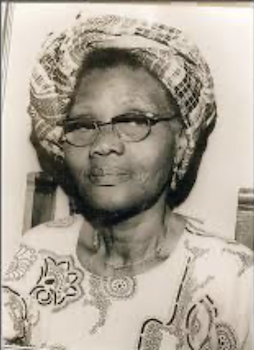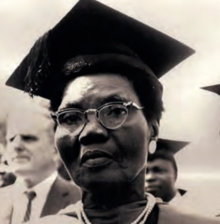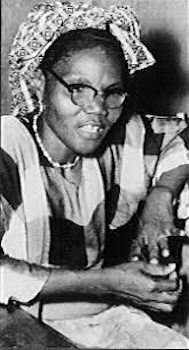
Funmilayo Ransome Kuti, also known as Funmilayo Aníkúlápó- Kuti, was born on October 25, 1900, in Abeokuta, Edgbaland, (now Ogun state) Nigeria. She was born to devout Christian parents who initially named her Frances Abigail Olufunmilayo Thomas. Her father was a farmer and her mother was a dressmaker. Being educated themselves, her parents readily sent Ransome-Kuti and her siblings to school. Ransome-Kuti attended St. John's Primary School in Abeokuta. From a young age, Ransome-Kuti had already begun to make history; she was the first female to attend Abeokuta Grammar School from the year 1914 to 1917; this was very significant because at that time, it was highly unusual for females to be educated. In furtherance of her passion for education, Ransome-Kuti attended the Wincham Hall School for Girls in England from 1919 to 1923. It was during this period that Ransome-Kuti dropped her English name and adopted her Yoruba one, no longer being “Frances” but “Funmilayo”. She thereafter returned to Nigeria where she briefly taught at her former secondary school.
During this period, Ransome-Kuti married her husband Israel Olotodun Ransome-Kuti in 1925. She had four children with him, one of them being her son Olufela (Fela) Anikulapo-Kuti, the famed pioneer of the afrobeat genre.
She opened the Abeokuta Ladies Club (ALC) in 1932 after her husband became the principal of the Abeokuta Grammar School. The club, initially open only to western-educated women and daughters of elites, had the aim of promoting the welfare of women, and it was through the club that Ransome-Kuti gave literacy lessons to the women in the form of night classes. As time went on, the club saw a change in its objectives as Ransome-Kuti’s passion for female political involvement grew. It was during this period that the club became open to participation from illiterate women and women who sold food and other wares, at the open market stalls around 1944.
One of Ransome-Kuti's most memorable movements was the establishment of the Abeokuta Women's Revolt (also called a Riot) which lasted from 1946 to 1949. The basis of the revolt was the imposition of hefty taxes by the traditional leader, Alake Ademola II, on women who were either unemployed or traders who sold their wares in the market stalls. These taxes were to be collected by the Sole Native Authority (SNA) from each province, which in the case of Abeokuta was Alake. These taxes, after collection, were sent to the British colonial masters. Since no woman was a part of the council of SNA, they remarked that “no taxation without representation”.
Another contentious issue was that women as young as 15 years were being made to pay the taxes as opposed to their male counterparts whose payments started at the age of 18. It was during this period that the name of the club was changed to the Abeokuta Women’s Union (AWU), a mark to signify their solidarity against the harsh treatment.

During the plans to protest the taxes, Ransome-Kuti was said to have taught women how the effects of tear gas could be stopped or minimised. In the 1947 protest against the refusal to stop the taxation, up to a 1,000 women were famed to have taken part in the march to the palace of Alake. Despite this, Alake did not revoke the taxes. The government continued to operate, and any woman who was guilty of not paying the sum was beaten and jailed.
It was not until October 1947 that the women’s protests grew in impact and numbers. A record 10,000 women staged two marches to Alake’s palace, and the numbers progressively increased until the number of women participating reached 50,000. It was after a series of the same protest, that Alake decided to remove the taxes. The protests also led to his abdication and exile from 1949 to 1950. Ransome-Kuti also led another anti-taxation protest in 1959 against the imposition of water taxes on the residents of Egbaland. This protest was also as successful as the previous one.
Ransome-Kuti was at the forefront of several other political activities. For example, the National Council of Nigeria and the Cameroons (NCNC), a leading political party chose her to be a delegate to London to protest against a proposed constitution that did not acknowledge Nigeria’s right to self-governance in 1947. While she was there, it was reported that she presented speeches to the media arguing against the continued exclusion of women in Nigeria both politically and economically. Ransome-Kuti also suggested the creation of the Nigerian Women’s Union (NWU), which was approved with the AWU becoming the Abeokuta branch of the association. Ransome-Kuti was noted to have been particularly adamant in speaking in her native mother tongue, even during meetings with colonial personnel.
Another aspect of Ransome-Kuti's diplomacy and political activism was rooted in her notoriety after her lectures against the proposed constitution in Britain. In 1948, she was invited to attend meetings of the Women’s International Democratic Federation (WIDF); which is an anti-fascist, antiwar organisation that engages women to combat racism and sexism, created by the Soviet Union. This led her to travel to China and the former Soviet Union. Eventually, she met Mao Zedong to discuss the position of women in Nigeria. Over ten years later after the news of this meeting resurfaced, her travel visa to America was revoked because she had ties to communists. It was later restored after the Nigerian independence in 1960.

During her lifetime, Ransome-Kuti ran for public office twice, once in 1951 under the NCNC party. Unfortunately, this was unsuccessful because while women would have been a major source of her votes, they were unable to vote due to a taxpayer only voting policy, preventing them from exercising their suffrage. This loss did not discourage Ransome-Kuti but rather motivated her. In 1953, she hosted a conference with 400 delegates to form the Federation of Nigerian Women’s Societies (FNWS) in order to promote the inclusion of women in politics, improvement in healthcare, and educational opportunities.
Her second go at political office was in 1959, also under the umbrella of the NCNC. This time, however, she was denied the ticket to represent the party as its candidate. This led her to run as an independent candidate under the wing of a new party which she created: Commoners Peoples Party (CPP). During the election, votes were split between her and the chosen NCNC candidate, leading both to a loss to another party’s candidate. Despite this loss, the people’s willingness to vote a woman into power was made clear through Ransome-Kuti’s strong presence in the election. Unfortunately, the CPP failed to gain momentum, leading to its dissolution a year later. It was also around this time that the opposition created the National Council of Women Societies (NCWS) in order to rival Ransome-Kuti's FNWS.
Ransome-Kuti was a recipient of one of the most prestigious awards and titles, including the Member Order of the Niger (MON). This award is given to members of the public, who have either made great contributions to the nation or some other achievement. She also received an honorary doctorate degree from the University of Ibadan. In addition, she received the Lenin Peace Prize, awarded to notable individuals, who are recognised by the panel to have strengthened peace amongst comrades. She was also made the first Oloye, a chief in Yoruba land. Ransome-Kuti is also fondly referred to as the Lioness of Lisabi because of her courage and steadfastness to all causes she set her mind to. To many Nigerian children, Ransome-Kuti is remembered as the first woman in Nigeria to both own and drive a car, something that was unusual during that time.
Ransome-Kuti tragically died in 1978 at the age of 77. At that time, she occasionally stayed with her son, Fela Kuti, who was also a popular activist and critic of the military government. She was killed when a group of soldiers, numbering over 1,000, stormed his home in Kalakuta Republic, searching for Fela. They tossed her out of the second floor of the building, and then she fell into a coma which she never woke up from. As a result, she died due to her injuries.
Ransome-Kuti will always be remembered as one of the most prominent Nigerian suffragettes, an educator, a leading female politician, and a major campaigner for African freedom and independence.
Why Did I Choose to Research Chief Olufunmilayo Ransome-Kuti?
For as long as I can remember, Funmilayo Ransome-Kuti has always been a woman everyone in Nigeria was expected to know. My first introduction to her was in primary school where all we were simply told about her was that she was the first woman to drive a car in the country and of course, that she was also Fela's mother. It wasn't until I grew up that I realized she was more than that. She was a politician and a women's rights advocate, something seemingly taboo at that time. For these reasons, I could not pass up this wonderful opportunity to research and learn more about her and also share my findings with others.
Works Cited
African Feminist Forum. Retrieved from https://www.africanfeministforum.com/funmilayo-ransome-kuti-nigeria/
Agunbiade, T (2020, October 1). Remembering Funmilayo Ransome-Kuti: Nigeria’s ‘lioness of Lisabi’ Aljazeera. Retrieved from https://www.aljazeera.com/features/2020/10/1/the-lioness-of-lisabi-who-ended-unfair-taxes-for-nigerian-women
Àwóṣùṣì, O. A (2023, July 29). Leading the marginalized: The political activities of Funmilayo Ransome-Kuti, Oriire. Retrieved from https://www.oriire.com/article/leading-the-marginalized-the-political-activities-of-funmilayo-ransome-kuti
Haag, K. L. Women in history: Funmilayo Ransome-Kuti, Encyclopaedia.com. retrieved from https://www.encyclopedia.com/women/encyclopedias-almanacs-transcripts-and-maps/ransome-kuti-funmilayo-1900-1978
Fabiyi, R (2016, August 17). Funmilayo Ransome-Kuti and the Abeokuta women riots, The Nigerian Voice. Retrieved from https://www.thenigerianvoice.com/news/226116/funmilayo-ransome-kuti-and-the-abeokuta-women-riots.html
Funmilayo Ransome-Kuti, Britannica. Retrieved from https://www.britannica.com/biography/Funmilayo-Ransome-Kuti
This article was published on 7/31/24